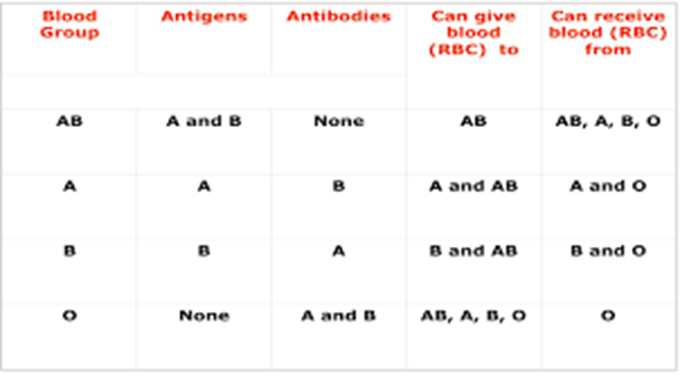Yellow sclera may indicate dysfunction of which of the following organs?
Kidneys
Appendix
Liver
Spleen
The Correct Answer is C
a. Kidneys: Kidney dysfunction can affect waste elimination and fluid balance but does not typically cause yellow sclera.
b. Appendix: The appendix is involved in the immune response and gut flora regulation but not in causing yellow sclera.
c. Liver: Liver dysfunction can lead to jaundice, where bilirubin accumulates in the blood and tissues, causing yellowing of the skin and sclera.
d. Spleen: The spleen is involved in blood filtration and immune response but does not directly cause yellow sclera
Nursing Test Bank
Naxlex Comprehensive Predictor Exams
Related Questions
Correct Answer is A
Explanation
a. AB positive: Individuals with AB positive blood are universal recipients. They have A and B antigens on their red blood cells but no antibodies (anti-A or anti-B) in their plasma. Therefore, their body will not reject blood types A, B, AB, or Rh positive or negative.
b. A positive: Individuals with A positive blood can only receive A positive or O positive blood. Their plasma contains anti-B antibodies, which would attack blood types B and AB.
c. B negative: Individuals with B negative blood can receive B negative or O negative blood. Their plasma contains anti-A antibodies, which would attack blood types A and AB. The Rh factor is another compatibility consideration, but the question specifies positive.
d. O negative: Individuals with O negative blood are universal donors but not universal recipients. Their red blood cells lack A and B antigens, so they can be donated to anyone. However, their plasma contains anti-A and anti-B antibodies, so they can only receive O negative blood.

Correct Answer is B
Explanation
a. Vas deferens: This is a tube that transports sperm from the epididymis to the ejaculatory ducts but does not form the bulk of the testis.
b. Seminiferous tubules: These tubules are where sperm production (spermatogenesis) occurs and constitute the majority of the testicular mass.
c. Seminal vesicles: These are glands that produce seminal fluid and are not part of the testis.
d. Corpus cavernosum: This is erectile tissue found in the penis, not in the testis.
Whether you are a student looking to ace your exams or a practicing nurse seeking to enhance your expertise , our nursing education contents will empower you with the confidence and competence to make a difference in the lives of patients and become a respected leader in the healthcare field.
Visit Naxlex, invest in your future and unlock endless possibilities with our unparalleled nursing education contents today
Report Wrong Answer on the Current Question
Do you disagree with the answer? If yes, what is your expected answer? Explain.
Kindly be descriptive with the issue you are facing.
